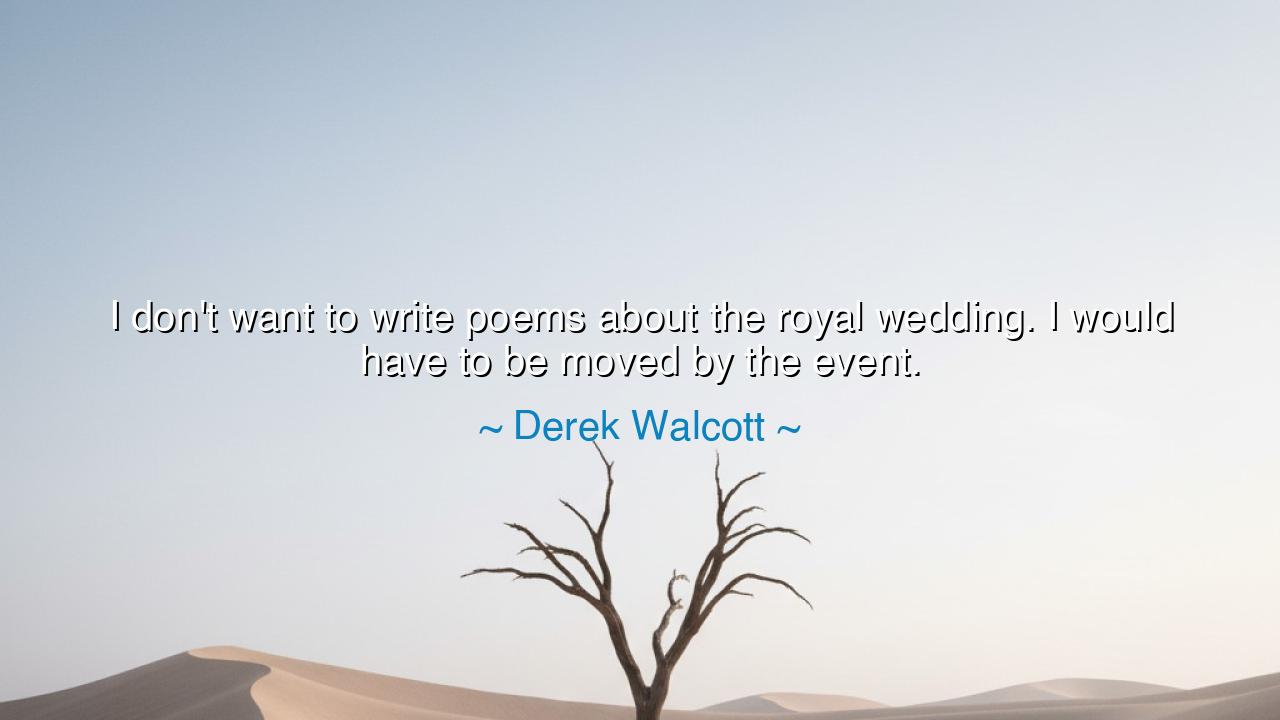
I don't want to write poems about the royal wedding. I would
I don't want to write poems about the royal wedding. I would have to be moved by the event.






Hearken, O seekers of truth and artistry, to the words of Derek Walcott, the poet whose heart was ever bound to the rhythms of the human spirit. He declares, “I don’t want to write poems about the royal wedding. I would have to be moved by the event.” In this simple yet profound statement, he reveals the essence of true creation: that art must flow not from duty or external demand, but from authentic inspiration.
The royal wedding, a spectacle of grandeur and tradition, captivates multitudes through its pageantry. Yet Walcott, a poet of the soul, reminds us that true poetry is not birthed from mere spectacle. It is forged in the fires of genuine emotion. To write of something without feeling is to create hollow verses, stripped of life and truth. Thus, he refuses to craft words for a moment that does not stir his inner being, guarding the sanctity of his craft.
This sentiment echoes the teachings of the ancient poets. Homer, in his epic tales, did not merely recount battles and feasts; he sang of love, rage, loss, and triumph because his people felt those truths in their bones. Likewise, Rumi wrote not of kings’ ceremonies, but of the mystical union between the human soul and the divine. These masters knew, as Walcott knows, that a poet must speak from depth of experience, not from the hollow echoes of others’ expectations.
Consider the court poets of medieval kingdoms, who were often compelled to praise their rulers and commemorate royal events. Though their verses dazzled the court, many lacked the fire of sincerity, and thus, few endured through time. In contrast, the works born from genuine inspiration—like the love sonnets of Petrarch, written for his beloved Laura—still ignite hearts centuries later. Walcott’s words serve as a defense of this higher standard, where truth outweighs grandeur.
Walcott’s refusal also teaches us about the responsibility of the artist. In a world eager for spectacle and distraction, the poet becomes a guardian of authenticity. By refusing to write without inspiration, he preserves the integrity of his voice, reminding all creators that art must never be reduced to mere ornament for the powerful or the popular.
Thus, O children of creation, heed this wisdom: do not be swayed by the brilliance of crowns or the noise of the crowd. Write, speak, and create only when your soul is moved, for only then will your work carry the weight of eternity. A royal wedding may dazzle the eyes, but it is the unseen truths of the heart that awaken the pen and give birth to words that will never fade.






TLTran Thi Luong
Walcott’s stance on writing about the royal wedding reveals a certain integrity in his artistic process. He doesn't feel compelled to create unless he truly feels something. This raises an important question: Do we value art more when it comes from an artist’s personal connection to the subject? Is it possible for an artist to maintain their authenticity in a world where events are constantly demanding creative responses?
NNNhat Nguyen
I admire how Derek Walcott emphasizes the importance of emotional connection when creating art. His reluctance to write about the royal wedding unless moved by it makes me think about how media often pressures artists to respond to events in a particular way. Should art be a response to public sentiment, or should it remain independent and true to the artist’s inner world?
VTVan Thien
The idea that Derek Walcott would only write about the royal wedding if he were 'moved by the event' speaks to the authenticity required in his art. It makes me wonder, how often are artists expected to respond to events simply because they are in the public eye? Does this challenge the value of art created under such pressure, as opposed to art that is inspired by deep personal resonance?
HGHoang Ha Huong Giang
Walcott’s perspective on the royal wedding shows his commitment to writing from a place of authenticity. It raises an interesting question: How many poems, books, or songs are written just because an event demands it, rather than because the artist truly connects with it? Should art always be driven by personal emotion, or are there times when an artist can create without being moved by the subject matter?
DTThan Duc Tu
Derek Walcott's reluctance to write poems about the royal wedding reflects his need for genuine emotional connection with an event before he can be moved to create art. It makes me think: Can true art come from obligation, or must it always come from personal inspiration? Does this mean that many of the poems we read about major events may lack true emotional depth if they were written out of duty?